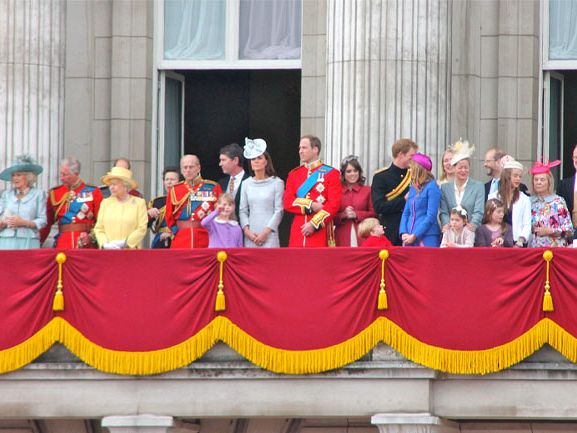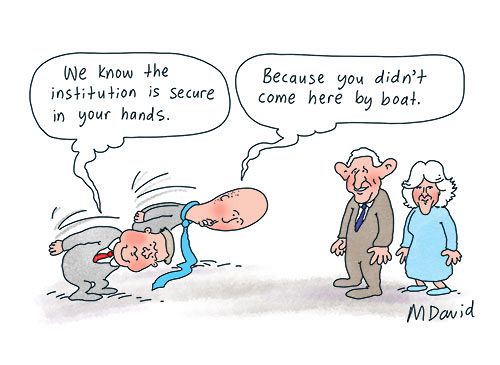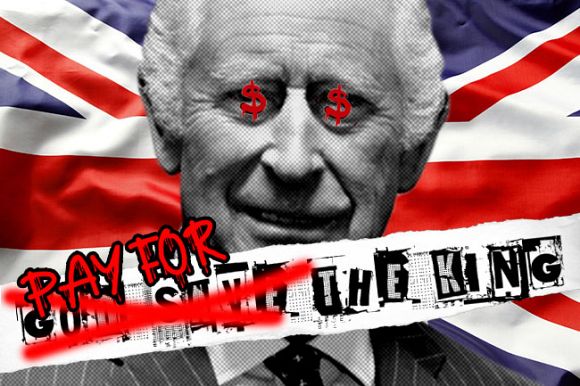From balcony waves to podcast beefs, the Windsors remain Britain’s most entertaining export, writes Vince Hooper.
LAST WEEK’S royal news cycle was set spinning by reports that Prince William and Princess Kate may (or may not) have been extended a private reconciliation invitation by Prince Harry — a palace move described by “sources” as both a possible olive branch and a carefully stage-managed non-event. As with all things Windsor, the real drama isn’t whether it happened, but how many column inches it can fill. The monarchy’s greatest modern skill isn’t governing; it’s generating cliffhangers out of lunch plans.
Britain’s Royal Family is often described as “the Firm”, though this undersells the genius of its business model. Most companies need to actually sell something. The Royals operate on a more innovative revenue stream: existing. Centuries of brand recognition, a global media echo chamber and a fan base as loyal as football ultras keep the product moving. Every balcony wave, hat feather and perfectly practised look of dignified boredom is part of a finely tuned marketing campaign. Think Disney Princess franchise — but with prime real estate portfolios, priceless heirlooms and a taxpayer-funded security detail.
Defenders say they provide stability and continuity, which is true — if by stability you mean a family tree that never misses a branch and continuity meaning the ceremonial transfer of expensive hats from one head to another. In an era when governments turn over faster than celebrity marriages, the royals offer the comfort of people who have never applied for a job and never will.
Critics ask what they actually do all day. This is unfair. They work extremely hard: cutting ribbons, unveiling plaques, nodding gravely at flood-defence diagrams, enduring school plays in draughty assembly halls and on one memorable occasion, opening a sewage treatment plant — proof that royal service can be both ceremonial and aromatic. Even their lesser-spotted cousins do their bit: Edward and Sophie, who seem to have been tasked with attending events nobody else wants, soldier on gamely in perpetually windy car parks.
William is the prestige drama — groomed with military precision, spending his days moving between charity galas and PowerPoint briefings about new bus lanes. He’s the “safe pair of hands” in whose hands nothing much actually changes, though the tabloids remain obsessed with his “frosty” relationships and his hairline’s determined retreat.
Harry is the breakout character who left the show but kept the name, now living in California with a rescue chicken coop, a podcast schedule and a publishing contract large enough to refurbish Buckingham Palace’s west wing. For his supporters, he’s the brave truth-teller; for his detractors, he’s the man who swapped service for streaming rights and took the family WhatsApp group hostage in the process.
Kate is the storybook future queen: perfect posture, diplomatic coat dresses and the kind of fixed smile that could hold the Commonwealth together during a solar eclipse. Meghan arrived like a Hollywood showrunner: sharp, camera-ready and unwilling to accept “that’s just how it’s always been” as a production note. The press has turned their parallel lives into a cottage industry: Kate wears a dress, it’s “timeless elegance”; Meghan wears the same dress, it’s “provocative” or “tone-deaf,” depending on the phase of the moon and the editorial budget.
Then there’s Princess Anne, the monarchy’s unsung industrial engine, clocking up more engagements than the rest combined while wearing clothes that could be stored flat under a bed. Zara Tindall, officially untitled, still manages to generate more column inches through horse shows than some cousins do through a decade of ribbon-cutting. Fergie drifts around the periphery like a subplot the writers can’t quite kill off, while Prince Andrew has seamlessly transitioned from “working royal” to “working on his short game”, his public profile now as flat as the speed bumps he allegedly struggles to navigate in his Range Rover.
The monarchy’s pageantry remains its most marketable export. Coronations, Trooping the Colour, State Openings of Parliament — events so magnificently outdated they make Versailles look like an IKEA showroom. You haven’t truly experienced British pomp until you’ve watched a man in a bearskin hat faint while carrying a golden sceptre past a row of wilting ambassadors. It’s The Bachelor meets Game of Thrones, but with fewer dragons and more corgis.
We’re told the cost is a bargain: a few pounds a year from the taxpayer for this year-round, live-action soap opera. That’s the Sovereign Grant — a sum that, unlike most public spending, comes with gilt-edged stationery. The palace calls it good value; critics note that even their budget overruns could purchase diamond chandeliers. Tourists, we are told, come for the royals, as though a trip to London would be pointless without the promise that somewhere inside Buckingham Palace, a duchess is silently wondering if her hat is too wide for the carriage door. Americans romanticise them, Europeans puzzle over them and Australians take the mickey while secretly following the drama more closely than their own politics.
Covering the royals is governed by its own unwritten rules. Palace-approved quotes only, “insiders” who may be two degrees removed from the truth and denials issued just slowly enough to ensure the story has already led the breakfast news. Every “private reconciliation” is public by teatime and every “family summit” is somehow filmed from three angles.
The monarchy is Britain’s longest-running reality show — costumes by Savile Row, scripts by the Daily Mail, locations courtesy of the National Trust. They have no legislative power, but they have the kind of soft power most governments would kill for: the ability to turn a hat choice into a national talking point, a lunch invitation into a week of headlines and a speed bump into a scandal. They endure not because the constitution demands it, but because the country is hooked on the next instalment.
And so we wait, mugs in hand, for the next reconciliation rumour to flutter out of the palace gates — because in this show, even an RSVP is worth front-page news.
Vince Hooper is a proud Australian/British citizen and professor of finance and discipline head at SP Jain School of Global Management with campuses in London, Dubai, Mumbai, Singapore and Sydney.
Support independent journalism Subscribe to IA.




